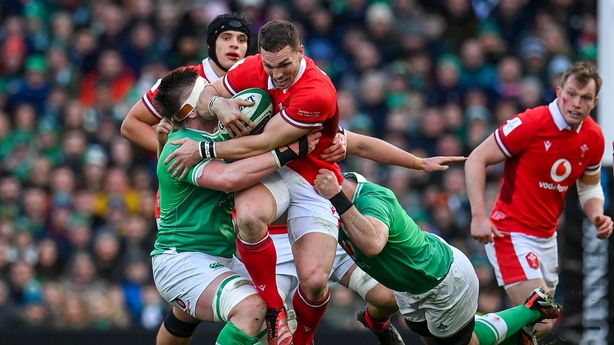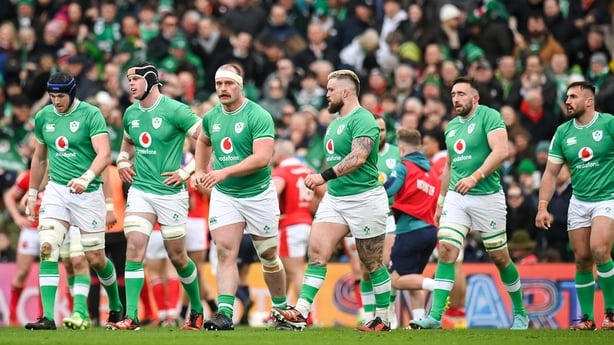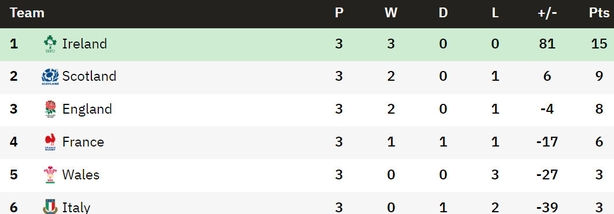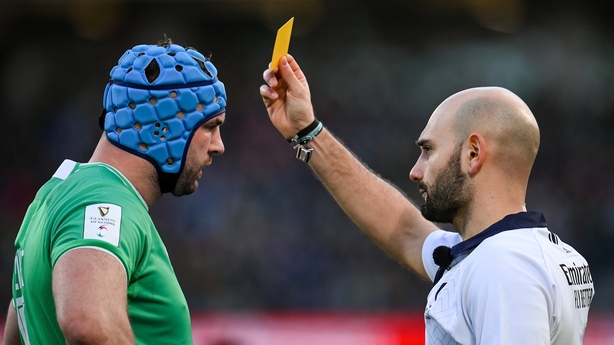Through three games of the Guinness Six Nations, the picture painted is one of Irish dominance.
The defending champions have maximum points so far with three bonus-point wins from three, while their 15 tries is more than double that of the next best scorers, with Scotland and Wales scoring seven each.
Aside from Ireland, defence has been trumping attack in this championship. Of the five other sides, only Wales have picked up a try bonus-point in the opening three rounds, doing so in their 27-26 defeat to Scotland.
Ireland's dominance so far is such that a win of any kind away to England on 9 March will give them an almost insurmountable lead at the top of the table. A bonus-point victory would see them crowned champions with a game to spare.
Merely winning the title would feel like an anti-climax though, given how comfortable the first three wins have been.
No team have won back-to-back Grand Slams in the Six Nations era. Andy Farrell's side have their eyes on that piece of history.
In their incredible run of form over the last two years, their attack has rightly been lauded for its pace, variety and ruthlessness, but it's been allowed to flourish by a miserly defence.
In three games in this championship, Ireland have conceded just 24 points in total, contributing to a points difference of +84. With Scotland next best on +6, it's effectively worth an extra point on the table.

Under Simon Easterby's guidance, Ireland's defence has consistently held its own. In their last 13 Six Nations games, they've conceded just 13 tries. For context, the next best defence in that time is France, who have given up 28.
"Our defence is top drawer, there's no doubt about that. It has been for quite some time now," Farrell said after Saturday's 31-7 win against Wales.
The only Welsh score came from a penalty try, and unlike the 36-0 win against Italy in which Ireland nilled an opponent for the first time in the championship since 1987, they had to defend for large periods against Warren Gatland's side.
The 190 tackles Ireland had to make is more than double what they had to complete against Italy a fortnight ago, with Caelan Doris contributing 21 of them, and all six of the replacement forwards having to hit double-figures.
"It was unbelievably fitting that we kept them out because of the fight and want to be able to do that. The try came from a maul.
"I thought our defensive shape wasn't very nice at times but our intent certainly on the line said a lot about how much they love defending for one another. That and the improvement in the scrum is there for all to see," Farrell added.
With penalty tries accounting for two of the three conceded by Ireland in the championship, you'd have to go as far back as the 40th minute of the opening round for the last open-play try given up.

And while that open-field defensive shape looks watertight, it does pose questions around Ireland's discipline.
One chart Ireland won't be pleased to be topping will be penalties conceded, with 37 given up so far, an average of just over 12 per game.
The scorelines will show that they haven't been made to pay for that indiscipline, but the third quarter against Wales was the perfect illustration of how the concession of penalties can be a momentum-killer.
Having been the right side of a 9-4 penalty count at half-time and leading 17-0, Ireland were penalised six times in succession to start the second half, one of which saw Tadhg Beirne concede a penalty try and get sent to the sin-bin.

"We're winning the penalty count hands down at half-time and then all of a sudden within minutes of the second half, it has evened up," Farrell added.
"That could happen in two weeks' time [against England], role reversal. The game takes its own shape but there's parts of our game we obviously need to improve.
"That's never, ever going to be any different but I suppose it won't be for England either."
An interesting pattern to emerge is how Ireland are not just conceding more penalties, but conceding them in clusters.
On Saturday, the six penalties they gave up in 11 minutes to start the second half were later followed by a flurry of three in three minutes before James Ryan's late yellow card, while in that instance Wales had multiple extra penalty advantages which went unused.
Similarly, eight of the 13 penalties they gave up against France can be attributed to a seven-minute spell just before half-time, and a separate four-minute block in the second half, which led to both French tries.
Those penalty flurries have the added consequences of cards.

The sin-bins for Beirne and Ryan on Saturday make it three yellow cards in three games for Ireland to start this championship.
The three previous yellow cards they gave up came across a span of 29 matches. Since receiving two red cards in the 2021 Six Nations, Ireland have had by some distance the best record in the world when it comes to picking up cards. Maintaining that squeaky clean image will continue to be vital.
The high penalty count is a testament to the defence, which has held firm on several occasions despite the opposition getting access to the 22 through indiscipline.
Equally, one could suggest that the two meet in the middle. With Andrew Porter (8) and Joe McCarthy (4) accounting for almost a third of Ireland's penalties, it suggests that some players are given extra license to push the boundaries a bit more than usual, and willing to give up some extra penalties in the long run.
It's a tricky balancing act, where the high levels of energy and aggression in defence may spill over into the concession of penalties. If the likes of Porter and McCarthy lose some of that abrasive edge they've had in the opening three games, would they also lose some of their defensive dominance?
A high penalty count might just be a price worth paying for a defence that's giving up an average of eight points per game.
Watch highlights of the weekend's action on RTÉ2 and RTÉ Player on Against The Head tonight at 8pm.


